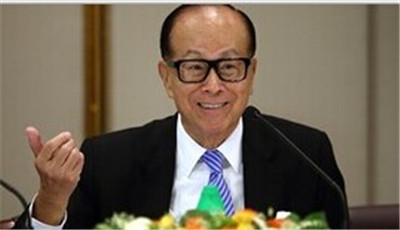(单词翻译:单击)
Investors yesterday gave his plans for a complete overhaul of his two main companies an emphatic thumbs-up, with double-digit rallies adding $11.5bn to their market capitalisation.
Cheung Kong closed up 14.7 per cent and Hutchison gained 12.5 per cent in Hong Kong yesterday. All of which has left investors, bankers and analysts asking why Mr Li did not do this sooner.
Analysts and dealmakers have produced a host of possible reasons for the timing of the deal. Some suggest it is related to succession planning, since Mr Li turns 87 this year. They also point to the possibility that Mr Li is seeking to free up capital for a target the group is quietly stalking; or that it is about escaping Hong Kong by moving the companies’ domicile to the Cayman Islands.
In choosing the Cayman Islands, Mr Li is following the more than 40 per cent of Hong Kong-listed companies already domiciled there, including groups such as Tencent, the Chinese internet group, and the listed units of many of China’s biggest state-owned enterprises.
“We do not believe this reflects on management’s view on the Hong Kong business environment,” says Danie Schutte, analyst at CLSA.
Analysts estimate that Cheung Kong tends to trade at about 50 per cent of its net asset value if its 49.97 per cent of Hutchison is excluded. Hutchison, meanwhile, averages an 18 per cent discount to its book value for being a conglomerate, according to CLSA, but before the news it was trading at a 37 per cent discount.
The aircraft deal, however, helped alleviate a build-up of cash at Cheung Kong as the property-focused group struggled to find land at good prices.
“We found another business to put some money to work which was aircraft leasing. Then questions started to come up — ‘why are you in aircraft leasing? Are you not a property company any more?’ So it became clear to us that a decision needed to be made on how we were going to delineate the businesses,” said Gerald Ma, head of strategy at Cheung Kong.
The blurring lines in turn increased investor uncertainty over where to invest. “Its not like we came up with an idea and they [Cheung Kong] said ‘Oh we should have this’,” said Frank Sixt, chief finance officer of Hutchison. “But you do get to a situation . . . where shareholders are saying ‘Well, where’s the growth going to be in this group?’”

投资者昨日对他彻底重组旗下两家主要企业的计划明显表示赞成,两家上市公司的股价涨幅达到两位数,市值增加115亿美元。
长江实业股价昨日在香港股市收涨14.7%,和记黄埔则上涨12.5%。所有这些都让投资者、银行人士和分析师不禁要问:李嘉诚为何没有早一点这么做?
分析师和交易撮合者为李嘉诚选择此时进行重组提出了很多可能的理由。一些人认为,这与交接计划有关,因为今年李嘉诚就87岁了。他们还指出,李嘉诚可能在寻求为该集团悄悄逼近的一个收购目标腾出资金;或者可能是为了通过把公司的注册地迁到开曼群岛来逃离香港。
在选择开曼群岛为注册地方面,李嘉诚效仿了超过40%的在港上市公司的做法,这些公司就是在开曼群岛注册,包括中国互联网集团腾讯(Tencent)以及很多中国最大国有企业的上市公司。
无论李嘉诚何时调整其覆盖52个国家的商业帝国的架构,都会有人抨击他试图逃离香港。然而,数位参与该交易的人士表示,该计划开始于去年夏季。这意味着在去年秋季“占中”抗议活动使得人们聚焦于香港政府及其与当地商业巨头的关系之前,重组决定已经作出。
里昂证券(CLSA)分析师丹尼尔•舒特(Danie Schutte)表示:“我们相信这并非反映了管理层对香港商业环境的看法。”两家公司自己也表示,此举是为了消除从控股公司的关联性导致的折让,为股东释放价值。
但按照这两家公司的说法,选择此时重组,是因为两家的业务日益交错。去年长江实业进入飞机租赁业务更是让这一点急剧凸显——从逻辑上来说,飞机租赁业务更应属于集电信、零售、基础设施、港口和能源于一身的和记黄埔。
然而,在以房地产为主的长江实业很难以合适价格拿到土地之际,飞机交易帮助其缓解了现金过多的问题。
模糊的业务界限让投资者更加不确定将资金投向哪里。和记黄埔首席财务官陆法兰(Frank Sixt)表示:“这不是我们提出一个想法,然后他们(长江实业)说‘哦,我们应该有这个想法’。但你的确会进入这样一种局面……股东会问,‘好吧,这家集团的增长方向在哪里?’”


